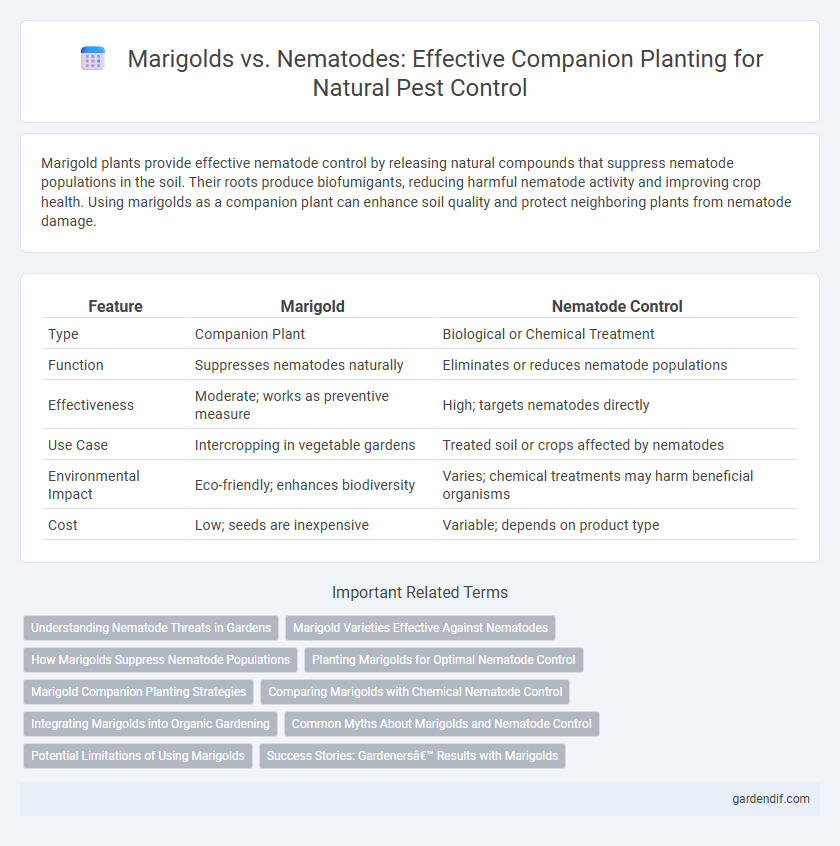
Marigold vs nematode control Illustration
Marigold plants provide effective nematode control by releasing natural compounds that suppress nematode populations in the soil. Their roots produce biofumigants, reducing harmful nematode activity and improving crop health. Using marigolds as a companion plant can enhance soil quality and protect neighboring plants from nematode damage.
Table of Comparison
| Feature | Marigold | Nematode Control |
|---|---|---|
| Type | Companion Plant | Biological or Chemical Treatment |
| Function | Suppresses nematodes naturally | Eliminates or reduces nematode populations |
| Effectiveness | Moderate; works as preventive measure | High; targets nematodes directly |
| Use Case | Intercropping in vegetable gardens | Treated soil or crops affected by nematodes |
| Environmental Impact | Eco-friendly; enhances biodiversity | Varies; chemical treatments may harm beneficial organisms |
| Cost | Low; seeds are inexpensive | Variable; depends on product type |
Understanding Nematode Threats in Gardens
Marigolds emit natural compounds that disrupt nematode reproduction and reduce their populations in garden soil. These plants specifically target root-knot nematodes (Meloidogyne spp.), which cause root galls and stunted plant growth. Integrating marigolds into crop rotations and garden beds offers an organic, sustainable method to minimize nematode damage and promote healthier plants.
Marigold Varieties Effective Against Nematodes
Marigold varieties such as Tagetes erecta and Tagetes patula are highly effective against nematodes due to their root exudates that produce thiophenes, natural compounds toxic to nematodes. These varieties disrupt nematode life cycles by suppressing egg hatching and larval development, making them ideal for crop rotation and soil health improvement. Cultivating marigolds in infested soil reduces nematode populations and enhances plant growth by naturally controlling root-knot nematodes.
How Marigolds Suppress Nematode Populations
Marigolds release natural bioactive compounds from their roots, such as alpha-terthienyl, which exhibit nematicidal properties that disrupt nematode development and reproduction. Their root exudates create a toxic environment for Meloidogyne spp. (root-knot nematodes), significantly reducing larval populations and root infestation levels. Planting marigolds as a trap crop or in rotation effectively lowers soil nematode densities, promoting healthier crop growth and increased agricultural yields.
Planting Marigolds for Optimal Nematode Control
Planting marigolds strategically can significantly reduce nematode populations by releasing natural compounds toxic to these soil pests. Research shows that species like Tagetes erecta and Tagetes patula are especially effective in suppressing root-knot nematodes, improving overall plant health and yield. For optimal nematode control, integrate marigolds in crop rotation or as border plants to maintain continuous nematode management throughout the growing season.
Marigold Companion Planting Strategies
Marigold companion planting strategies effectively reduce nematode populations by releasing natural biochemicals from their roots, which act as repellents or toxins to root-knot nematodes. Integrating marigolds into crop rotations or as border plants disrupts nematode life cycles, enhancing soil health and promoting higher yields in susceptible plants like tomatoes and potatoes. Optimal planting density and timing are crucial to maximizing nematode control benefits in companion planting systems.
Comparing Marigolds with Chemical Nematode Control
Marigolds (Tagetes spp.) offer a natural, sustainable alternative to chemical nematode control by releasing bioactive compounds that suppress nematode populations in the soil, reducing root damage in crops. Chemical nematicides, while effective in immediate nematode eradication, pose environmental risks such as soil and water contamination and potential harm to non-target organisms. Integrating marigold planting with targeted nematicide use can optimize nematode management by balancing efficacy with ecological safety.
Integrating Marigolds into Organic Gardening
Integrating marigolds into organic gardening effectively reduces nematode populations through natural root exudates that suppress these soil-borne pests. Tagetes species, particularly Tagetes patula and Tagetes erecta, are renowned for producing thiophene compounds toxic to root-knot nematodes, making them excellent companion plants for tomatoes, peppers, and cucumbers. Strategic intercropping with marigolds improves soil health and enhances plant resilience, contributing to sustainable nematode management without synthetic pesticides.
Common Myths About Marigolds and Nematode Control
Common myths about marigolds for nematode control often exaggerate their effectiveness, suggesting they fully eradicate nematodes, which scientific studies refute, showing only partial suppression of specific nematode species like root-knot nematodes. Gardeners should understand that while marigolds produce compounds such as alpha-terthienyl that have nematicidal properties, these effects are limited by factors including marigold species, planting density, and soil conditions. Integrating marigolds with other nematode management strategies, such as crop rotation and resistant plant varieties, provides a more reliable approach than relying solely on marigold planting.
Potential Limitations of Using Marigolds
Marigolds are often used as a natural nematode control due to their ability to release compounds harmful to nematodes, but their effectiveness may be limited by factors such as soil type, marigold species, and nematode species present. Some nematode species exhibit resistance or reduced susceptibility to marigold root exudates, reducing the plant's overall effectiveness as a biocontrol agent. Crop rotation and integrated pest management strategies are necessary to complement marigold use for more consistent nematode suppression.
Success Stories: Gardeners’ Results with Marigolds
Gardeners report significant nematode reduction using marigolds, with studies showing up to 70% decrease in root-knot nematode populations. Marigold roots release alpha-terthienyl, a natural nematicide that disrupts nematode life cycles and improves plant health. Successful integration of marigolds into crop rotations enhances soil quality and boosts overall garden yields without chemical pesticides.
Marigold vs nematode control Infographic

 gardendif.com
gardendif.com